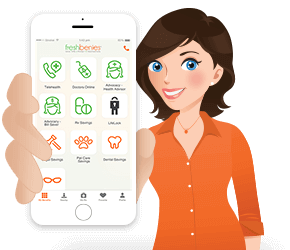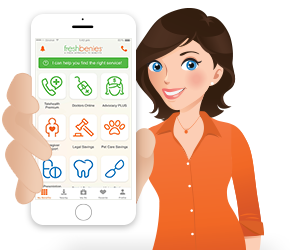KIDNEYS: WHAT DO THEY DO AND HOW CAN YOU KEEP THEM HEALTHY?
This is a guest post by Dr. Val Jones who works with our Doctors Online partners at eDocAmerica.
Do you remember the scene in Finding Nemo where the fish jam up their aquarium filter to get their dentist owner to clean the tank? That scene always makes me think of kidneys – because without them, our bodies would become rapidly overloaded with waste products, just like that dirty aquarium water!
Most of us don't spend much time thinking about our kidneys, and yet they are vital little organs. Not only do they filter our blood by producing urine, but they help to control our blood pressure and produce hormones that keep us from becoming anemic or weak-boned.
Kidneys are so efficient at filtering blood, that you only really need one to do the job. That's why kidney transplants are so popular – living donors can survive quite nicely with just one. Unfortunately, most other organs can only be transplanted if the donor is deceased.
Your kidneys are about the size of your fist and are located on either side of the low back, just below the rib cage. Large arteries supply them with about 200 quarts of blood per day, out of which 2 quarts of waste (i.e. urine) is created. Urine travels to the bladder from the kidneys through tubes called ureters. Urine is stored in the bladder until enough of it builds up to trigger an urge to go to the bathroom.
Your kidneys go about their business without much fuss, unless they are put at risk by the following:
- Dehydration – when people get dehydrated from insufficient fluid intake, this can actually harm the kidneys. They need a certain amount of fluid to pass through them to maintain their normal function. Sometimes people become dehydrated from summer heat or intense exercise, but accidental dehydration can also be triggered by blood pressure medicines or "water pills."
- Infection – urinary tract infections are quite common, especially in women. When these infections are left untreated, bacteria can crawl up through the bladder and into the ureters that reach the kidneys, and cause dangerous infections.
- Drugs – drugs are removed from the body by one of two major pathways: the liver and the kidney. If you take too much of a drug that is removed by the kidney, the concentration of the drug in the kidney can cause damage. Ibuprofen, aspirin, and naproxen are probably the most common medications that can hurt kidneys. But some people have more sensitive kidneys than others, and there are many possible drugs that can cause damage. This problem is so common that 66% of seniors will have signs of kidney injury (at some point) from the medicines they take! *
- High blood pressure – as you can imagine, the pressure of the blood going into the kidneys can itself cause damage if it's too high. The kidneys try to protect themselves from high incoming pressure with a complex hormonal messaging system that affects salt and artery elasticity. However, over time high blood pressure can overcome the kidney's defenses and injure their delicate tissue.
- Diabetes (or too much sugar in the blood) – when too much sugar remains in the bloodstream, it can "gum up" small blood vessels and tubes. The kidneys are full of tiny filtering tubes, and high sugar concentrations can injure them.
- Cysts – some people are prone to cyst formation (cysts are fluid-filled sacks that develop in the kidneys for unknown or genetic reasons). When there are many cysts present, they push on the normal kidney tissue and can prevent them from being able to filter properly.
- Cancer – kidney cancer is quite rare (we have about a 1.5% lifetime risk of developing it) but our risk for it increases if we smoke, have high blood pressure, or are obese.
What can you do to promote healthy kidneys?
- Drink plenty of water – How much is enough? Your kidneys will actually tell you if you've had enough. Check your urine color: if it's light yellow to clear, you are well-hydrated. Dark yellow or orange urine means you are dehydrated and need to drink more.
- Get tested (and treated) for high blood pressure. Most people cant "feel" high blood pressure so they don't always take treatment seriously. It is very important to take blood pressure medicine if you cannot control it with diet and lifestyle changes.
- Get tested (and treated) for diabetes. Again, people can't "feel" diabetes until damage is already done. Tight control of your blood sugar will reduce your risk of "gumming up" your kidneys and blood vessels.
- Take as few medications as necessary, and do not exceed recommended doses of over-the-counter or prescription medications.
- Do not smoke.
- Maintain a healthy body weight. Obesity is associated with high blood pressure, diabetes, and kidney disease.
- Make sure you treat urinary tract infections quickly. If you have a burning sensation or pain with urination, or are urinating more frequently than usual, check with your doctor right away. If you wait until you have a fever or back pain (that's what kidney pain feels like), you may have a serious or life-threatening infection. Your doctor may order a urine test to see if you have an infection, and then recommend specific antibiotics that will kill the type of bacteria that are causing the problem.
Just as Nemo and friends didn't like living in a dirty fish tank, we should take care of our kidneys so we don't end up in a similar situation! In most cases, kidney disease can be avoided by following the 7 tips listed above.
Now it's your turn! Have you gotten other expert advice on how to take good care of your kidneys? Comment below!
















